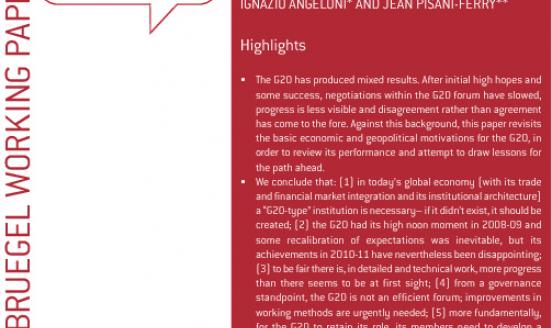The G20 should rise to the challenge (but probably won’t)
Everybody knows the euro area is at a critical juncture. A financial reform program is being prepared and should be on the table of the European Council on June 28-29. If things go well (read: if financial markets are reassured that Europe will eventually sort out its financial mess) this should not only redefine the institutional landscape of the zone for many years, but also lift some of the uncertainty overshadowing the global economy. Not by coincidence, President Obama has issued urgent calls for action to Europeans leaders, followed shortly after by the British Chancellor of the Exchequer and by the IMF Managing Director. The decision by Spain to seek EU financial assistance increases the urgency of reform, because it implies that the resources available for new rescues are getting thinner. Adding to the pregnancy of the moment, the outcome of the second round of Greek elections, on June 17, will decide Greece’s future as eurozone member, with all the contagion risks within and outside the area that any prospect of exit entails.
In view of all this, the G20 leaders convening in Los Cabos on June 18 and 19 would have a perfectly timed opportunity to do three things:
1. Review Europe’s financial reform plans as they shape up, providing advice and exercising peer encouragement to action;
2. Express readiness to provide support, within the IMF, to stabilise euro area financial markets while the “roadmap” is implemented (this support should naturally come from cash-rich emerging nations, with explicitly announced commitments);
3. Examine the need of coordinating macroeconomic policies to avoid that any spillover from the European crisis adds danger to the flimsy global recovery.
All three things fall within the remit of the G20 (“the principal forum of global governance”) but unfortunately none of them will happen. On the first point, Europe has already expressed its intention to focus the summit on growth and jobs; the deliverable should foreseeably be yet another “plan” without specific deadlines or commitments, along the lines of previous summit discussions. Growth and jobs are obviously fine in principle, but adopting such broad focus is likely to divert attention from the immediate challenges and even more from the actions to be undertaken. It is a pity, because Europe, while being ultimately responsible for its own actions, badly needs to explain itself and convince the global community that it is doing its best to resolve its problems. And it may, who knows, wish to receive further external assistance going forward (the fact that the IMF will not contribute to financing Spain this time does not necessarily mark the end of its active financial involvement in Europe).
Here comes the second point – financial contributions. It would be good to understand what to expect exactly after the recent meetings in Washington DC. On April 20, after the G20 Ministerial, the IMF announced the intention of its membership to increase the institution’s lending power by at least 430 million US$, to almost twice the existing amount. Reading that statement carefully, however, one discovers that almost half of that commitment was coming from Europe itself, and large part of the rest (from emerging nations specifically; the US had already called itself out) was conditional on internal consultations yet to be undertaken (the table in the press statement, unprecedented fact in IMF history, does not add up to the total!). Are these nations now ready to confirm and possibly increase their pledges? What is the effective additional contribution the IMF will be able to count on in assisting Europe, if necessary, especially in net terms? While the Los Cabos meeting should at least clarify this, an explicit statement of willingness to use these resources to assist Europe in its institutional transition would be very helpful to reassure financial markets, but is unlikely to come.
The last point – global recovery support – is perhaps the trickiest one. The G20 has given itself, since 2010, a framework for peer review and coordination of macro-policies, the socalled “mutual assessment process” or MAP (see a description here). The MAP should now be allowed to work. The problem is that global economic conditions have changed since the MAP was set up, or even since Cannes; external imbalances among large currency areas have shrunk and are now within safe bounds, partly as a result of movements in the patterns of global demand partly following exchange rate changes in the right direction. In the meantime new risks have emerged, stemming from increased oil prices and from new bouts of financial instability, in Europe specifically. The MAP should adapt to these changes under the guidance of the IMF. However, the commitment of the IMF in performing its role as “arbiter” of the MAP, and perhaps towards the whole G20 process, has been, so far, half-hearted.
In the background, the fundamental problem of the G20 at the moment is that, after the successes of 2008 and 2009, the process has lost steam due to lack of ownership and leadership. The US and UK, originally the main drivers, have lately been conspicuously detached. The emerging countries, in spite of the generous efforts by Koreans during their turn in the chair, have on the whole been incapable (or unwilling) to pursue the historical opportunity to participate as pears in the global economic governance game. Europe has been, and remains, mainly concentrated on its own problems, believing – wrongly – that they will remain confined within its borders.
